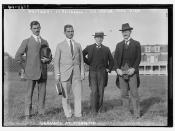When asked to discuss the origins of the first world war, there is generally little debate. Most would site the growth of Germany as an economic, military and naval power, the rise in nationalism and an arms race throughout Europe. All of which was characterized by the growing occurrence of political disruptions, culminated by the assassination of Arch Duke Ferdinand in Serbia. This is, of course true, but many historians tend neglect the effect of demographic change on a society. During the late 1800's and up to 1914, most European nations were undergoing fundamental changes in the makeup of their societies. Some countries experienced dramatic rises in population, while others were stagnating or even in decline. The changes in population in Europe greatly affected the balance of power. This had effects on nationalism, militarism and influenced the popular attitudes toward war across Europe. Demographic changes in Europe made "The Great War" inevitable.
Europe has always been politically tumultuous. Conquerors and revolutionaries have traded power with despots and dictators, back and forth, for centuries. Prior to the nineteenth century, Great Britain and France were the two major players. With the conquest of Napoleon, the First and later the Third, it seemed the rivalry was over in Europe. In the late nineteenth century Europe had a relatively stable, albeit precarious, balance of power. The empires could focus their attention toward colonies and trade. This peace lasted until the turn of the century when a new threat to the status-quo arose. This threat to the balance of power was the growth of Germany. In 1850 France's population was almost 36 million, the largest in Europe, with the exception of Russia who had 57 million. France was therefore the central power in Europe. Though Great Britain only had 27.6 million, it remained powerful due...


